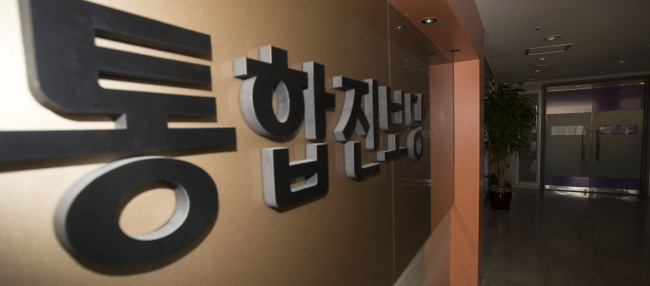Venice Commission requests verdict records on UPP disbandment
By Korea HeraldPublished : Dec. 21, 2014 - 21:13
The Venice Commission, an advisory board to the Council of Europe, asked South Korea’s Constitutional Court for an English version of its ruling to dissolve the minor leftist Unified Progressive Party last week, officials said Sunday.
On Friday, the Constitutional Court ruled in favor of disbanding the minor opposition party, concluding that it aimed to overthrow the South Korean government and create a communist country like North Korea.
The request by the commission, of which South Korea is a member, reflects the international attention drawn by the ruling and that the decision will be reviewed in accordance with international standards, according to some observers. Others claimed that the request was simply related to research on the growing number of court decisions worldwide on party disbandment.
The Venice Commission, formally known as the European Commission for Democracy through Law, is a consultative organization of members of constitutional courts in 47 countries.
The commission provided its views on the dissolution of political parties in 2009. Its guidelines state that political parties should be disbanded only when they have used or attempted to use violence to overthrow democratic and constitutional order.
The Constitutional Court of Korea has begun translating the 347-page ruling, upon which the UPP was immediately disbanded and parliamentary seats were stripped from five UPP lawmakers. But the work is expected to take more than six months, officials said.
It was the first case in South Korean history of a political party being disbanded by a judicial power. The Constitutional Court was formed in 1988.
In its ruling, the court said the UPP had violated South Korea’s “basic democratic order,” ruling that the party’s fundamental doctrines were based on North Korea’s ideals.
The ruling sparked a heated discussion over South Korea’s deepening ideological divide, with conservatives welcoming it and progressives condemning it.
President Park Geun-hye’s office praised the ruling as a “historical decision.”
“It was a historical decision that firmly protected the liberal democracy in the country,” Yoon Doo-hyun, Park’s senior secretary for public affairs, told reporters Saturday.
On Friday, the Constitutional Court ruled in favor of disbanding the minor opposition party, concluding that it aimed to overthrow the South Korean government and create a communist country like North Korea.
The request by the commission, of which South Korea is a member, reflects the international attention drawn by the ruling and that the decision will be reviewed in accordance with international standards, according to some observers. Others claimed that the request was simply related to research on the growing number of court decisions worldwide on party disbandment.
The Venice Commission, formally known as the European Commission for Democracy through Law, is a consultative organization of members of constitutional courts in 47 countries.
The commission provided its views on the dissolution of political parties in 2009. Its guidelines state that political parties should be disbanded only when they have used or attempted to use violence to overthrow democratic and constitutional order.
The Constitutional Court of Korea has begun translating the 347-page ruling, upon which the UPP was immediately disbanded and parliamentary seats were stripped from five UPP lawmakers. But the work is expected to take more than six months, officials said.
It was the first case in South Korean history of a political party being disbanded by a judicial power. The Constitutional Court was formed in 1988.
In its ruling, the court said the UPP had violated South Korea’s “basic democratic order,” ruling that the party’s fundamental doctrines were based on North Korea’s ideals.
The ruling sparked a heated discussion over South Korea’s deepening ideological divide, with conservatives welcoming it and progressives condemning it.
President Park Geun-hye’s office praised the ruling as a “historical decision.”
“It was a historical decision that firmly protected the liberal democracy in the country,” Yoon Doo-hyun, Park’s senior secretary for public affairs, told reporters Saturday.

The main opposition New Political Alliance for Democracy expressed concern that the ruling had severely damaged the nation’s political freedom.
“(We) would never support the UPP. Nonetheless, the decision on disbanding the UPP should have been made by the people,” said NPAD spokesperson Park Soo-hyun.
Meanwhile, the UPP lawmakers who lost their seats said Sunday that they would file a complaint against the state, arguing that the court had abused its judiciary power.
UPP Reps. Kim Mi-hyui, Kim Jae-yeon, Lee Sang-kyu, Lee Seok-ki and Oh Byung-yun claimed the top court had no right to strip them of their seats in the parliament based on their party membership.
The National Election Commission also plans to hold a meeting to decide whether to strip the statuses of other UPP members in local assemblies elected by proportional representation in the June 4 local election. There are six UPP members in local parliaments nationwide. The election watchdog said it would undergo legal consultations before making a decision on Monday morning.
Members of the disbanded party and progressive civic groups over the weekend launched candlelight rallies to protest the court’s decision. About 1,000 people participated in the street protest, accusing the Constitutional Court of “demolishing democracy.”
UPP chairwoman Lee Jung-hee said after the ruling that the country was ruled by “a dictator” and vowed to continue protesting the decision.
“The (Park Geun-hye) administration would think that it has succeeded in oppressing the opposition, but we will continue to take a larger parade toward democracy,” she said.
But the street protests by the members and supporters of the disbanded party will face restrictions by law enforcement agencies. The prosecution warned the UPP members that it was illegal to hold protests as the party was no longer recognized as a political entity and that their rallies would be considered illegal.
By Cho Chung-un (christory@heraldcorp.com)
-
Articles by Korea Herald



![[Herald Interview] 'Amid aging population, Korea to invite more young professionals from overseas'](http://res.heraldm.com/phpwas/restmb_idxmake.php?idx=644&simg=/content/image/2024/04/24/20240424050844_0.jpg&u=20240424200058)













![[KH Explains] Korean shipbuilding stocks rally: Real growth or bubble?](http://res.heraldm.com/phpwas/restmb_idxmake.php?idx=652&simg=/content/image/2024/04/25/20240425050656_0.jpg&u=)

